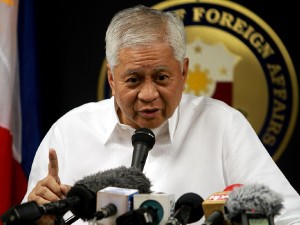MANILA, Philippines – The Philippines has taken the step of bringing its West Philippine Sea (South China Sea) disputes to China before an Arbitral Tribunal under the United Nations Convention on the Law of the Sea (Unclos) for a peaceful resolution, Foreign Affairs Secretary Albert Del Rosario announced Tuesday.
Del Rosario, in a press conference, said that a note verbale detailing the Philippine’s claim that “challenges before the Arbitral Tribunal the validity of China’s nine-dash claim to almost the entire South China Sea (SCS) including the West Philippine Sea and asking China to desist from unlawful activities that violate the sovereign rights and jurisdiction of the Philippines under the 1982 UNCLOS” was handed to Chinese Ambassador to the Philippines Ma Keqing at around 1 p.m. Tuesday.
“The Philippines has exhausted almost all political and diplomatic avenues for a peaceful negotiated settlement of its maritime dispute with China……To this day, a solution is still elusive. We hope that the Arbitral Proceedings shall bring this dispute to a durable solution,” Del Rosario said.
“We hope that China would join us in this aspiration,” Del Rosario said.
Del Rosario noted that Solicitor General Francis Jardeleza has been tasked as the country’s legal representative in the proceedings. He added that Paul Reichler of Foley and Hoag LLP will serve as the country’s legal counsel.
Del Rosario said that the country’s move to notify China of its decision to pursue a legal track “initiates the arbitral proceedings under Article 287 and Annex VII of UNCLOS,” and was made in pursuant of President Benigno Aquino III’s mandate to use a “rules based-approach” policy to defend the country’s territory and maritime domain.
In a separate sheet containing prepared questions and answers for the press, the DFA noted that the Philippines had adopted “political, diplomatic, and legal approaches to solving the disputes but that “at this stage, the legal track presents the most durable option to defend the national interest and territory on the basis of international law.”
Del Rosario, in the press conference, said that the Philippines wants the UN arbitral tribunal to issue a declaration saying that China’s nine-dash line claim were invalid and were contrary to Unclos; directing China to respect the Philippines’ sovereign rights and jurisdiction over its Exclusive Economic Zone (EEZ), continental shelf, contiguous zone, and territorial sea over the West Philippine Sea; and to ask China to desist from activities that violate the country’s sovereign rights.
In his statement, Del Rosario noted that the country asserted that an arbitral tribunal has the authority to hear and make judgments based on the Philippines’ claim “because the dispute is about the interpretation and application by state parties of their obligations under Unclos.”
“While we proceed with the legal track, the Philippines continues to exert all efforts to move forward and enhance its relations with China on the basis of mutual respect,” Del Rosario said.
The DFA noted that though there were factors to consider, it believes that the country had “a very good case under international law.”
“What is more important is that we are able to present our case against China……We expect the international law to be the great equalizer,” it said. It added that based on cases so far handled by international tribunals on maritime disputes, it would take three to four years to resolve the case.
It added that since arbitration was a peaceful means to solving disputes, the Philippines’ action should not be a cause for adverse effects on the relations between the two countries, and that the country would “continue to pursue an enhancement of our bilateral relations in all areas of cooperation.”
The DFA also noted that its decision was not influenced by any other country.
When pressed for reaction, the Chinese embassy, in an emailed statement sent by its spokesperson Zhang Hua, said that Ma Keqing met with DFA Assistant Secretary Theresa Lazaro and was handed the note verbale.
Zhang added that Ma Keqing stressed that China has indisputable sovereignty over islands in the South China Sea and its adjacent waters.
“The Chinese side strongly holds the disputes on South China Sea should be settled by parties concerned through negotiations. This is also the consensus reached by parties concerned in the Declaration on the Conduct of Parties in the South China Sea,” Zhang said in the statement.
Both countries are embroiled in territorial disputes over atolls and reefs in the West Philippine Sea (South China Sea), believed to be the site of vast oil and gas resources.
The disputes among claimant countries have heightened in recent weeks, with a report of China’s plan to board and seize ships that enter what it claims to be its territory in the disputed sea.
China claims nearly the entire sea, while the Philippines, Malaysia, Brunei, Vietnam and Taiwan claim parts of the area, believed to be the site of oil and gas deposits.
China’s purported plan came days after it issued new passports bearing a map showing China’s nine-dash claims in the West Philippine Sea. Both the Philippines and Vietnam have refused to stamp the Chinese e-passports in protest of China’s claims, and have also sought China’s clarification on its new maritime patrol rules.


